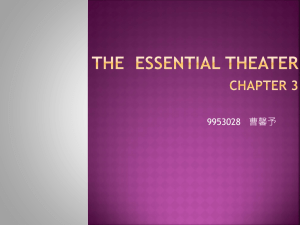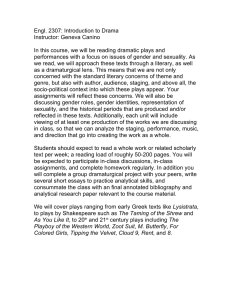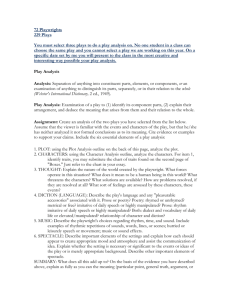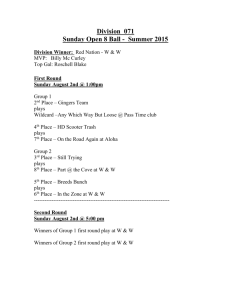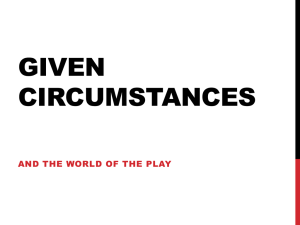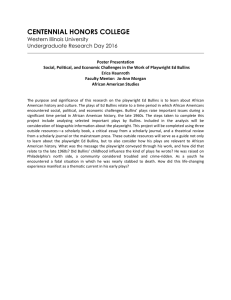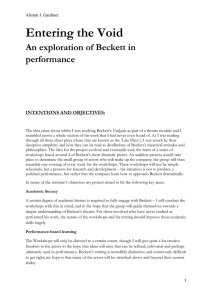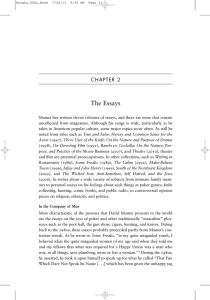Christopher Grobe
advertisement
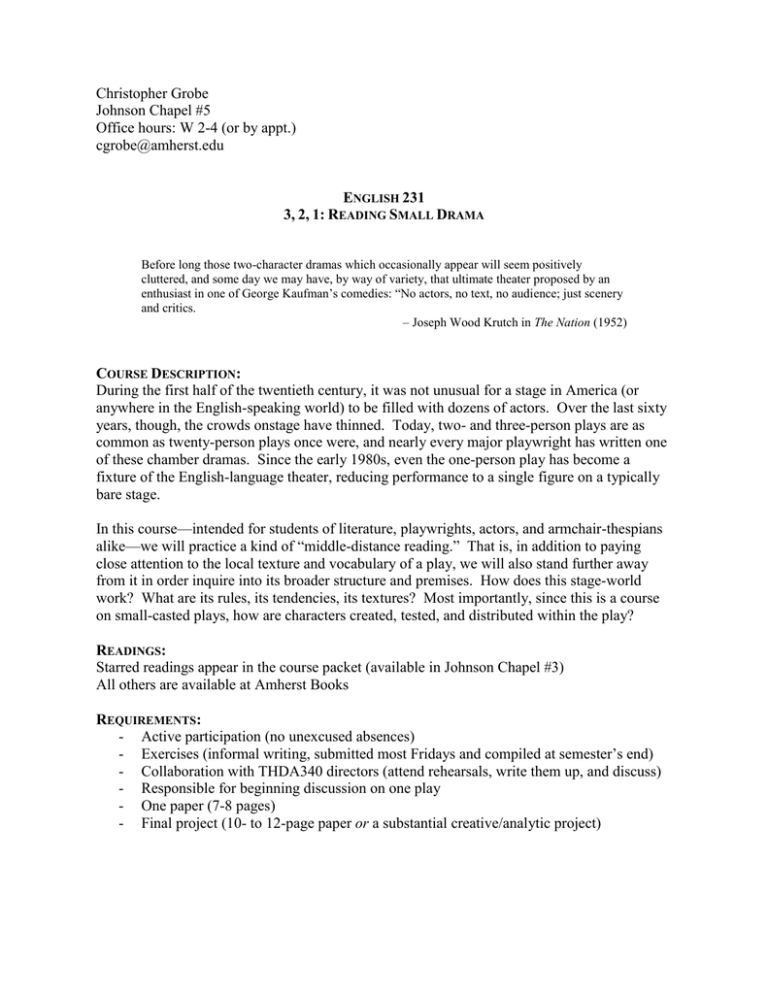
Christopher Grobe Johnson Chapel #5 Office hours: W 2-4 (or by appt.) cgrobe@amherst.edu ENGLISH 231 3, 2, 1: READING SMALL DRAMA Before long those two-character dramas which occasionally appear will seem positively cluttered, and some day we may have, by way of variety, that ultimate theater proposed by an enthusiast in one of George Kaufman’s comedies: “No actors, no text, no audience; just scenery and critics. – Joseph Wood Krutch in The Nation (1952) COURSE DESCRIPTION: During the first half of the twentieth century, it was not unusual for a stage in America (or anywhere in the English-speaking world) to be filled with dozens of actors. Over the last sixty years, though, the crowds onstage have thinned. Today, two- and three-person plays are as common as twenty-person plays once were, and nearly every major playwright has written one of these chamber dramas. Since the early 1980s, even the one-person play has become a fixture of the English-language theater, reducing performance to a single figure on a typically bare stage. In this course—intended for students of literature, playwrights, actors, and armchair-thespians alike—we will practice a kind of “middle-distance reading.” That is, in addition to paying close attention to the local texture and vocabulary of a play, we will also stand further away from it in order inquire into its broader structure and premises. How does this stage-world work? What are its rules, its tendencies, its textures? Most importantly, since this is a course on small-casted plays, how are characters created, tested, and distributed within the play? READINGS: Starred readings appear in the course packet (available in Johnson Chapel #3) All others are available at Amherst Books REQUIREMENTS: - Active participation (no unexcused absences) - Exercises (informal writing, submitted most Fridays and compiled at semester’s end) - Collaboration with THDA340 directors (attend rehearsals, write them up, and discuss) - Responsible for beginning discussion on one play - One paper (7-8 pages) - Final project (10- to 12-page paper or a substantial creative/analytic project) CLASS SCHEDULE: INTRODUCTION January 23rd – “Just Scenery and Critics” In-class: Samuel Beckett, Breath (film); Edward Albee, Box (handout); Francesco Cangiulio, Detonation, or Synthesis of All Modern Theatre (handout); SuzanLori Parks 365 Plays (selections on handout) January 25th – Character, Structure, World Fuchs, The Death of Character (excerpt)*; Woloch, The One v. The Many (excerpt)*; States, Great Reckonings in Little Rooms: On the Phenomenology of Theater (excerpt)* THREE-PERSON January 30th & February 1st – Odd Man Out Harold Pinter, The Caretaker (1960) David Mamet, American Buffalo (1975) February 6th & 8th – Power Triangles Athol Fugard, Master Harold … and the boys (1982) Sarah Kane, Blasted (1995) February 13th & 15th – Triangulation Brian Friel, The Faith Healer (1980) Michael Frayn, Copenhagen (1998) February 20th and 22nd – One, Two, Many Paula Vogel, Baltimore Waltz (1992) Caryl Churchill, The Skriker (1994)* TWO-PERSON February 27th and 29th – Face to Face Edward Albee, Zoo Story (1958) Amiri Baraka, The Dutchman (1964) March 5th & 7th – Collaborations Sam Shepard, Cowboy Mouth (1971) Suzan-Lori Parks, Topdog/Underdog (2001) March 12th & 14th - Crossfire David Mamet, Oleanna (1992) (optional screening) Donald Margulies, Collected Stories (1998) Paper #1 (due 3/16): Pick a pair of plays from our syllabus. Use local close-readings within each play to make a larger claim about their shared narrative or dramaturgical problems. (7-8 pages) March 19th & 21st SPRING BREAK March 26th & 28th – [Revise, Reboot] Argument Workshops Revision of Paper #1 due (7-8 pages) April 2nd & 4th – Two-in-One Eugene O’Neill, Hughie (1959) Samuel Beckett, Krapp’s Last Tape (1958) Not I (1972), Footfalls (1975), Ohio Impromptu (1981) (read texts and attend Beckett on Film screenings) ONE-PERSON April 9th & 11th – E Unibus Pluram Eric Bogosian, Men Inside (1981) Anna Deavere Smith, Fires in the Mirror (1991) April 16th & 18th – The Story Spalding Gray, Swimming to Cambodia (1986) David Greenspan, The Myopia (1999) April 23rd & 25th – The Confession Wallace Shawn, The Fever (1990) Sarah Kane, 4.48 Psychosis (1998) April 30th & May 2nd – Wrap-Up & Presentations on Final Project Final Project (due May 7th) Option #1 In consultation with me, choose and read at least two other plays by a playwright on this syllabus. Write a 10- to 12-page paper analyzing some aspect of this playwright’s dramaturgy. Option #2 Write a one-act play, paying special attention to the configurations of character we have studied in this class. Attach an explanation of the relationship between your play and the dramaturgical strategies of the playwrights we have studied. (Please consult with me before pursuing this option.)

